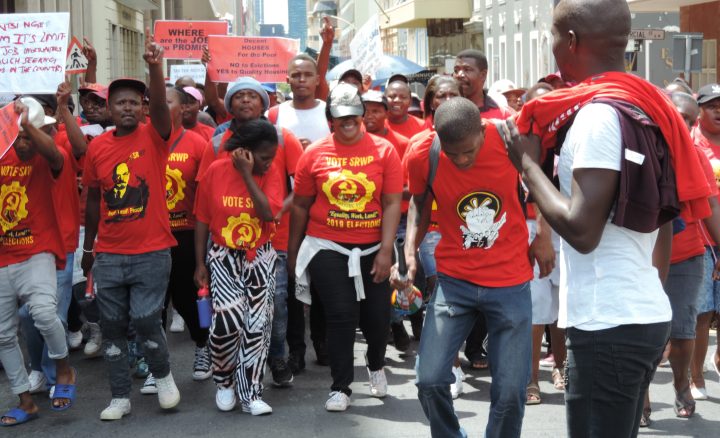BUDGET 2019
A tale of two marches

Trade union federations Cosatu and Saftu took to the streets before the 2019 Budget speech to protest against the unbundling of Eskom, the subsequent possibility of job losses, and broader worker issues of unemployment. Despite the similarity of their agendas — and even marching on the same route to Parliament — the two federations protested separately and on different days. Saftu, a breakaway body, is opposed to the ANC government’s economic policies, while Cosatu’s aims are to hold the government accountable, but to remain within the fold as a member of the tripartite alliance.
“Zizo Jika izinto! (things will change)” was the lyrical chant that rang out as workers in red garb assembled on Keizersgracht Street in Cape Town on Tuesday and Wednesday, the traditional starting point for inner-city marches.
The workers took part in separate marches to Parliament by rival trade unions — the Congress of South African Trade Unions (Cosatu) and the South African Federation of Trade Unions (Saftu) — on 19 and 20 February respectively. Both delivered memorandums opposing, among other issues, the unbundling of Eskom and potential job losses. The protests were intended to coincide with the 2019 Budget speech delivered by Finance Minister Tito Mboweni.
Despite both federations having fundamental similarities, such as a socialist agenda and opposing capitalism, the two are opposed to each other because of politics. They differed on the recent Minimum Wage Bill. Saftu said the Bill prescribed “slavery wages” while Cosatu pushed for its implementation.
Former Cosatu secretary-general Zwelinzima Vavi formed Saftu on 21 April 2017 after he had been ousted from Cosatu. Saftu initially consisted of breakaway unions — it now has 24 affiliates.
At a briefing before the march, Saftu provincial secretary Andre Adams said the federation was uniting all trade unions under a common cause to advance worker rights and was willing to work with Cosatu.
Cosatu march
Tuesday’s Cosatu march was a culmination of nationwide strikes which began on 12 February. At a press briefing before the march, Cosatu referred to the “high expectations” they held for the Budget speech. On Tuesday, 19 February, hundreds of people marched to Parliament. Deputy Speaker of the National Assembly Lechesa Tsenoli received a memorandum. The main concerns raised involved job losses and working conditions. Members of the South African Teachers Democratic Union (Sadtu), the National Union of Mineworkers (NUM), and Police and Prisons Civil Rights Union (Popcru) were among those present.
Beyond possible job losses due to the unbundling of Eskom and the threatened closure of Edcon, employed workers wanted better working conditions, wages and job security.
“I have been working for an NGO for 10 years and I want to be permanent. We want to ask government: When will it be our time to be permanent?” said shop steward Masnoena Isaacs from Touching Nations, a nursing union.
Although workers had difficult working conditions, marchers said there was a sense that coming together would result in their voices being heard.
Cosatu was optimistic about the Finance Minister Mboweni’s Budget speech, saying it would “set the tone” and “speak of ways to address the challenges facing the country and change the lives of the poor majority”.
Although Eskom’s unbundling and the rejection of independent power producers (IPPs) were key rallying points, many workers, when asked, were not always clear on what exactly this would entail. But what they were clear on was that they felt the effects of the mismanagement and corruption that had taken place at Eskom.
“I’m not sure about what is happening at Eskom, but what I know is that they take our lights without telling us and that is dangerous. If our children are outside, they can get killed. You don’t know if you should go outside or what,” said Aletta Jacobs, a member of Touching Nations.
Saftu march
In a statement delivered at a briefing in Bellville, held before Wednesday’s protest action by Saftu, Vavi outlined the union’s main demands.
“We want government to: Increase taxes on the rich, recover unpaid taxes and illicitly exported funds, stop the laundering of money into tax havens, increase spending on vital public services and implement initiatives to reverse social expenditure cuts and create jobs.”
These were among the demands reiterated at the march.
“We will no longer support a white capitalist system,” shouted workers at the march, as they held red paper placards on which read: “No to increase in electricity and water prices” and “Retrench bosses, not workers”.
Many Saftu marchers came from rural areas, with some travelling long distances to join the protest.
“I travelled here from Saldanha this morning,” said Anelisa Ntantiso, a member of the Socialist Revolutionary Workers’ Party (SRWP).
“I am here because we have been promised things, but those promises have not been fulfilled,” she said.
“We don’t have enough water, electricity or toilets,” she continued. “There are pit toilets and when we want to use the toilet, we must ask our neighbours. If they say, ‘no’, we must use the public toilets, which are in poor condition.”
Emile Maseko, on behalf of the Commercial Stevedoring Agricultural and Allied Workers Union (CSAAWU), highlighted that farmworkers are still oppressed, especially in vineyards.
“We feel like it’s still apartheid,” he said.
“They only want our labour, they don’t see us as humans,” he continued.
He said retired farmworkers were being kicked off farms with no provision for temporary housing — and that the houses farmworkers presently lived in were falling apart.
Outside the gates of Parliament, Minister of Finance Tito Mboweni received and signed the Saftu memorandum. DM

















 Become an Insider
Become an Insider